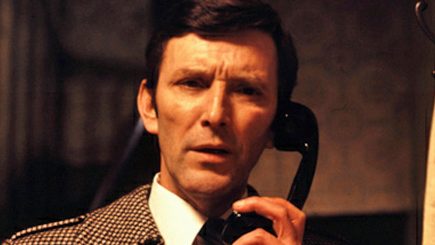Reading television’s history

I continue to lament that journalistic criticism about television in Britain today remains, with a few honourable exceptions, pretty poor. But if you know where to look, there is much rich writing about the medium’s history – and I thought today I would simply highlight a handful of recent contributions to two key web sites. My first link, however, is distinct from these, being a piece marking the passing of a major television drama producer who was particularly influential in the 1970s and ’80s.
• Barry Hanson obituary, for the Guardian by Christopher Hampton, with a brief comment by Stephen Frears
When I was writing about television at Time Out at the end of the ’70s Barry was at the top of his game. He had produced the pilot film of Gangsters and The Naked Civil Servant, both 1975, and the following year he had overseen the terrific Plays for Britain series of single dramas for Thames. Trevor Preston’s serial Out, 1978, was a startling crime drama with a riveting central performance by Tom Bell (above). And Barry Hanson followed this with the Stephen Frears-directed Stephen Poliakoff drama Bloody Kids, 1980. (There’s a good piece about this television film on the So It Goes... blog here.)
I can still remember watching open-mouthed a preview of Bloody Kids in the London viewing theatre of Central, and thinking that the team had brought to the screen a particularly convincing vision of a J. G. Ballard-like dystopia. I asked Ballard himself to write about the film for Time Out but sadly he declined. Barry, however, had little time for such intellectual analysis – he wanted to tell great stories about the contemporary world for a mass audience, and in this he often succeeded brilliantly. Here’s Christopher Hampton from the piece I’ve linked to above:
From the Royal Court, Barry brought with him [to television] an instinctive sense of commitment to the directors he worked with – including Stephen Frears, Michael Apted and Ken Russell – and, even more strongly, to the writers: John Osborne, David Mercer, Howard Brenton, David Rudkin, Trevor Preston and Stephen Poliakoff. In disputes with management, he invariably took the side of the artist, but the colder winds that began to blow in the 1980s, as television was prised from the fingers of the creators and handed over to ever thicker layers of administrators, created a climate that no longer suited his buccaneering temperament.
• Experiments in colour and electronic film systems: George’s Room (1967): David Rolinson and Simon Coward at British Television Drama.
Barry Hanson and director Alan Clarke worked together on Roy Minton’s Fast Hands, 1976 (available on the Network DVD of the Plays for Britain series). And Clarke’s television work is now finally beginning to receive its due, not least because of the BFI’s truly great Dissent and Disruption: Alan Clarke at the BBC box set. And in this blog post at the invaluable British Television Drama website David Rolinson and Simon Coward explore the fascinating story behind the production of George’s Room for Rediffusion’s Half-Hour Story strand. As they explain,
Clarke directed this colour version at Wembley Studios, using the same electronic multi-camera set-up as his black and white Half-Hour Story plays. However, George’s Room adapted this set-up in order to use ‘E-cam’, a system designed to make filmed drama in television studios. There were similar attempts to combine television and film technology elsewhere in the television and cinema industries – as we shall see – but Rediffusion were pioneering the integration of film and the electronic multi-camera studio. George’s Room was the main pilot experiment to test ‘E-cam’, which makes it a fascinating moment in British television drama, a stepping stone to possible futures in the use of colour and the convergence between television and cinema.
David Rolinson also wrote recently at British Television Drama about another early Alan Clarke-directed drama, Stella, 1968
• Finding a fragment of a lost television drama: The last seven minutes of ‘Play of the Month: The Magistrate’ (BBC1 20 December 1972): Billy Smart for Forgotten Television Drama.
Forgotten Television Drama is another essential website featuring accessible academic explorations of television history, including this terrific recent post by my friend Billy Smart reflecting on the joys and the frustrations of discovering just seven minutes of an otherwise lost lavish drama production from 1972:
Discovering that the last seven minutes of a 1972 Play of the Month production of Arthur Wing Pinero’s Victorian comedy The Magistate(1885) have managed to survive (unnoticed) in the BBC Archives presents a good opportunity to test the methodology of reconstruction-by-fragment, and consider what can be discerned and what remains unknowable from getting to see a substantial extract. The clip was transferred to a digital recording in 1999, when it was originally found at the end of a BBC Viewing Library VHS tape of an unrelated gardening programme. […]
Even though – as a historian – I understand all of the sensible institutional and technological reasons why so much old television was not preserved, The Magistrate is a good example of the sort of production that makes me exclaim “For God’s sake, couldn’t you at least have keep that?” when I collate filmographies. The most recent (and first colour) production of a much-loved evergreen of the classical repertory, well-received at the time of broadcast and featuring performances from some of the best regarded and most popular comic actors of their day, The Magistrate was a programme with more evident claims to commercial and artistic posterity than much of the BBC programming that was retained from this time.
Another equally interesting recent post on Forgotten Television Drama isJohn Hill’s Ken Russell, Ken Loach and ‘documentary’ as ‘forgotten TV drama’.
Leave a Reply